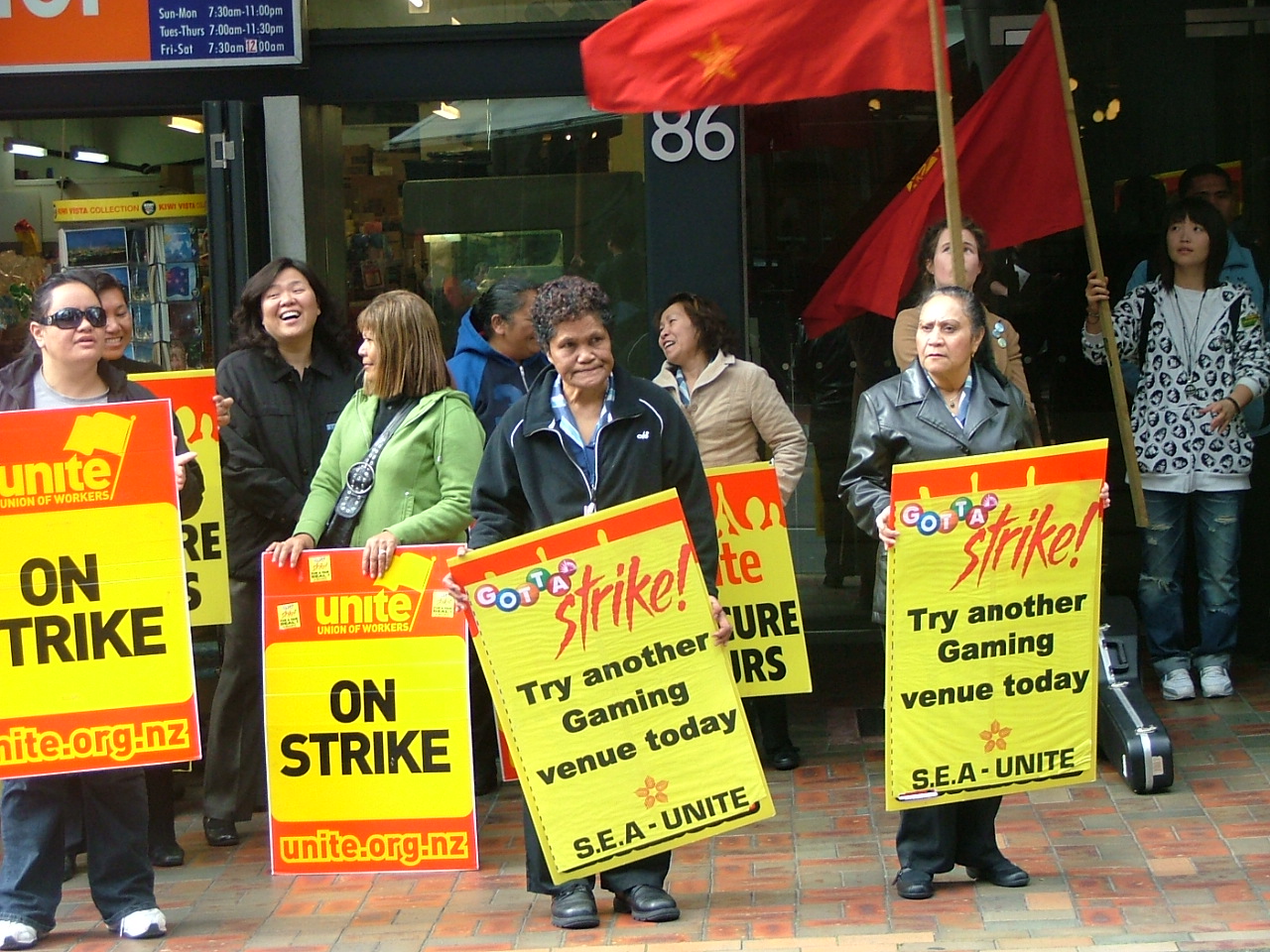This article was first published in the July issue of The Spark . It was contributed by a Christchurch Unite member, Joshua Wood.
. It was contributed by a Christchurch Unite member, Joshua Wood.
In New Zealand we eat from at least one of the nine American fast food corporations that have opened shop here. We have little real choice about whether we want fast food in New Zealand or in our lives, as fast food is now becoming the fastest, largest and in some cases the cheapest food available.
But is working in fast food what the industry makes it out to be? The answer to that is a big fat NO it’s not.
I started my work in hospitality in 2006 in fast food. Moving around from fast food outlet to fast food outlet, one thing I noticed pretty fast is that they all expected the same from you; long hours, fast work, low pay, and a demand for you to come in with little or no notice on your day off or to start hours earlier than you where meant to. Often half an hour or even 10 minutes before you finish you would be asked to stay longer sometimes with no real need for it.
The current hourly rate at the site worked at is $13 a hour, a large majority of fast food outlets make enough to cover wages within seconds of opening the doors. This is because the company’s investment (labour, plant, logistics, and advertising) on producing its commodities for sale is well below the cost at which it sells them. We who make and sell the products see little in return.
Fast food companies say they are poor and cant pay our staff anymore without cutting hours and making products more expensive, but this is obviously not the case.
A message for all you big bosses out there, stop working us harder, longer and faster for the same pay , and to all workers your rights are under attack so stand up fight back and be heard.
Seventy percent of workers in New Zealand want new jobs
by Byron Clark
Job advertising website SEEK’s 2010 Employee Satisfaction and Motivation survey, which had about 3000 respondents, has found that 70% of New Zealand workers are wanting a new job this year with one in four planing on leaving their jobs in the next three months. The main reason was looking for ‘a challenge’ (28%) followed closely by feeling unappreciated at work (23%). Nearly half of those surveyed (49%) responded negatively to the question “How’s the current morale in your workplace” and a slightly higher number (52%) said they would not recommend their friends apply for jobs at the organisations employing them.
What would change that would be better management (49%) and more employee motivation (41%) about a quarter of respondents also said better pay and work environment would make a difference. This open ended question also drew responses such as “ Cut the amount of work required to increase the salary to bring it into line with the extra work done for no pay” and “stop breaching employment law”.
When asked what they liked about their jobs, the most common response was “people I work with” (19%) and when asked what they hated 24% said the stress levels and 23% said the overall quality of management. Those in ‘service and support’ industries appear to have it worst, feeling less happy and less secure, as well as more likely to hate aspects of their workplace. Most were planning on leaving their job in the next six months. While 30% of young “generation Y” workers cited boredom as a reason for seeking new jobs (compared to 15% for generation X and 12% for Baby Boomers) they “tend[ed] to be more upbeat, [and] confident about their future” according to the report.
Freedom of expression @ work – a short interview with Julie Tyler

Friday January 4, Burger King held a disciplinary meeting against Dunedin employee Julie Tyler. Her alleged misconduct was the posting of the following sentence on a friend’s Facebook wall, ‘Real jobs don’t underpay and overwork like BK does’. Julie’s union, Unite, her friends, and other workers successfully built up public opposition against BK before the initial disciplinary meeting took place.
At the initial meeting Burger King adjourned the case until today, saying they were seeking further legal advice. During the adjournment BK’s censorship of staff members became a national media issue. BK New Zealand’s own Facebook page was jammed by comments of protest. Other Facebook groups – which attracted heavy traffic – were created and used in Julie’s defence. An informational picket was put on at Julie’s store today during the second disciplinary meeting. As a result the company has threatened legal action against Unite Union but Unite has replied that it will not be silenced.
The case not only raises issues surrounding the use of social media, it has also drawn attention to very basic working class issues such as freedom of expression and the right of workers to take action. Later on today we had the opportunity to have a quick word with Julie about how the case has unfolded so far:
Continue reading “Freedom of expression @ work – a short interview with Julie Tyler”
BULLIED YOUR BOSS LATELY?
Don Franks
According to a feature in today’s Dominion Post, “one in five Kiwi workers suffer from workplace bullying, one of the worst rates in the world”.
The claim’s made by a Minister of Labour commissioned university survey, released on 16/4/2010.
A joint university research team – from Auckland, Waikato, Massey and London – polled more than 1700 workers from the health, education, hospitality and travel sectors asking how frequently they were exposed to “negative acts” at work.
Overall 17.8 per cent of respondents were identified as victims of bullying.
The international range was claimed to be between 5 per cent and 20 per cent. Continue reading “BULLIED YOUR BOSS LATELY?”
Strike rights threatened
Mike Kay
A Private Member’s Bill introduced by the National Party MP Tau Henare has been drawn from the ballot to be debated in Parliament. The Bill proposes to amend the Employment Relations Act as follows:
“A strike may not proceed under this Act, unless the question has been submitted to a secret ballot of those employees who are members of the union that would become parties to the strike if it proceeded.”
The Council of Trade Unions has announced its “support in principle” for the bill, “as it largely reflects current practice.”
The British experience may be of some use in analysing the effect of secret ballots. Over there, the law has required a secret ballot prior to strike action for nearly 30 years. I asked an official with the Postal section of the Communication Workers Union his opinion on the issue. This is his response: Continue reading “Strike rights threatened”
A step forward
from The Spark March 2009
Finally, nearly a decade into the 21st century women will be legally entitled to breastfeeding breaks at work. From 1 April employers will have to allow women this right and provide a suitable space. The breaks are unpaid – unless otherwise agreed – so breastfeeding women will be penalised by loss of wages or having to extend their hours at work.
On its own the law may not deliver much of an improvement for women trying to juggle work and childcare. Few workplaces have childcare facilities, and few are very family friendly.
Despite these shortcomings, allowing breastfeeding at work is a step towards recognising the needs of working mothers.
